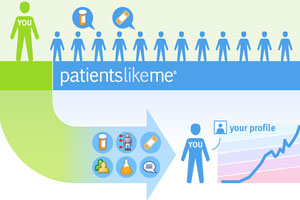CONCERNS have been raised about a social networking site where patients can compare symptoms and treatments even though it has the potential to become a revolutionary tool for medical research.
In an article in this week’s MJA, Associate Professor Lyndal Trevena, of the Sydney School of Public Health at the University of Sydney, describes the PatientsLikeMe website, which enables people with various health conditions to create a profile to record and track their health over time. (1)
Since the site was established in 2004, membership has risen to more than 115 000, with an expanding list of chronic conditions including amyotrophic lateral sclerosis (ALS), multiple sclerosis and Parkinson disease.
Dr Trevena said the site had opened up a new source of data for researchers, who are using the information generated on the site to examine issues such as the adverse effects of medications. For example, research recently published in Nature Biotechnology used data from the site generated by patients with ALS who experimented with lithium carbonate treatment. (2)
“Data reported by patients over the internet may be useful for accelerating clinical discovery and evaluating the effectiveness of drugs already in use”, the authors of the ALS research said.
Dr Trevena told MJA InSight that although PatientsLikeMe was obviously satisfying a niche for patients, it was a profit-driven website that had similar privacy and informed-consent concerns to other social networking sites.
“It is, I guess, a red flag for us to be aware of the fact that many of our patients will be signing up to these sorts of things and getting information from peers and the reports that they can generate. They’ll be able to look up what sort of side effects people have … on particular drugs we prescribe”, Dr Trevena said.
“They’ll be accessing this sort of information which we may not be privy to. It’s going to be really challenging for us, I think, to have those discussions about the validity of the data as opposed to the randomised controlled trials data, and it’s a moot point as to which is the most relevant.”
Professor Siaw-Teng Liaw, a professor of general practice at the University of NSW who has published research on social networking, said the website had good input from patients, and although it was concerning that it was profit-driven, the site was up-front about that fact.
“I think getting patients to be as well informed as possible [so] they can actually use PatientsLikeMe properly … and contribute to the rigour of the site, I think is really good.”
Dr Andrew Perry, immediate past chair of the AMA Council of Doctors-in-Training, said he didn’t see PatientsLikeMe as having a meaningful role in clinical practice yet but “that may change, down the track”.
“It’s more experiential rather than scientific or evidence-based. That isn’t to say that there isn’t any value in these sorts of websites, but there are certainly significant limitations”, said Dr Perry, who coauthored a recent Viewpoint article in the MJA about social media and the medical profession. (3)
Dr Sarah Mansfield, a co-author of the same MJA article, said she believed it was essential for doctors to be aware of such sites. “Over time, I think asking patients about their use of internet resources and social media will probably become part of a standard social history”, she said.
– Linda McSweeny
1. MJA 2011; 195: 258-259
2. Nature Biotechnology 2011; 29: 411–414
Posted 5 September 2011

 more_vert
more_vert